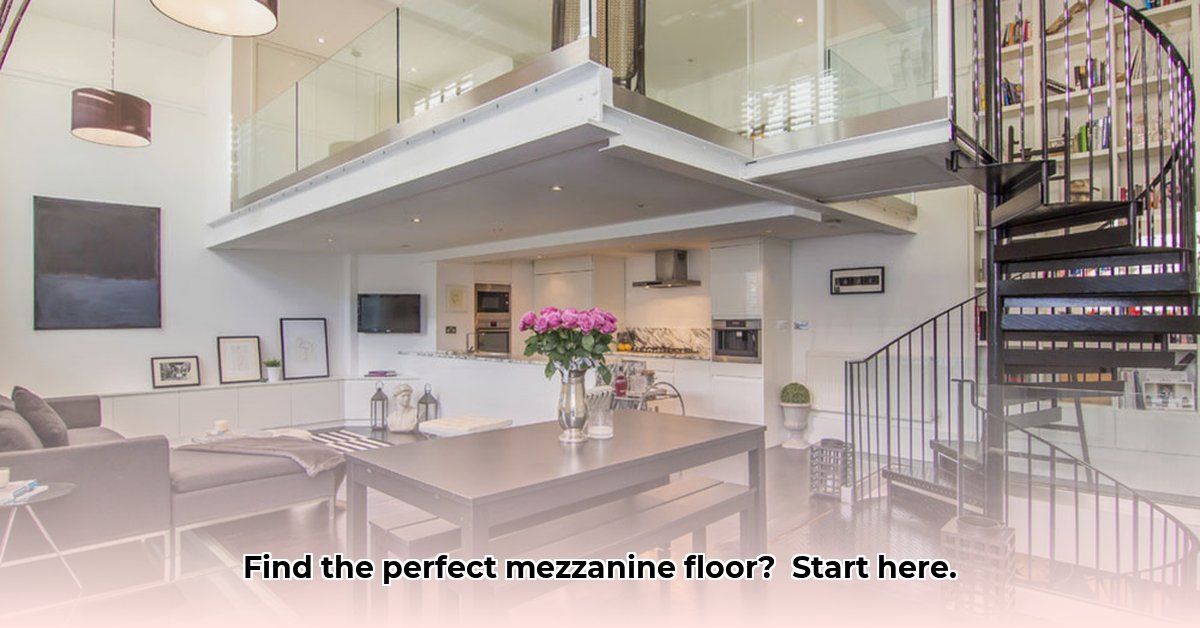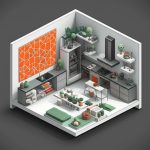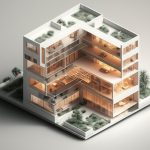Picking the perfect mezzanine floor is a big deal – it’s about getting the most out of your space, keeping costs down, and making sure everything runs smoothly for years to come. This guide compares two top manufacturers, ResinDek and Wildeck, to help you make the best choice. We’ll look at costs, how much weight they can hold, the materials used, and how easy they are to install. Whether you’re a building manager, an engineer, or someone in charge of buying supplies, this comparison will help you decide which mezzanine is right for you. For more affordable options, check out these affordable mezzanine options.
Mezzanine Floor Manufacturers: Making the Smart Choice for Material Handling
Picking the right company to build your mezzanine floor is a big deal. It’s not just about the initial cost; it affects how efficiently your space works and how safe it is for years to come. Two popular choices are ResinDek and Wildeck, and they each have their own strengths and weaknesses. Let’s break them down in a way that’s easy to understand, helping you find the ideal mezzanine floor manufacturers for your material handling requirements.
ResinDek: The Quick and Adaptable Solution for Industrial Flooring
ResinDek specializes in high-performance, engineered wood flooring panels designed for mezzanines and elevated platforms. Think of them as durable, modular components that offer a cost-effective and efficient flooring solution. This makes installation relatively fast and adaptable to various layouts. They’re engineered to withstand the demands of heavy machinery, including forklifts and automated guided vehicles (AGVs). ResinDek also offers electrostatic dissipative (ESD) options, which are essential in environments requiring static control.
The Good Stuff (Pros):
- Speedy Setup: Panel-based installation is generally faster compared to traditional steel structures.
- Heavy Lifting: Engineered to handle substantial loads – capable of supporting rolling pallet jack loads from 2,000 to 8,000 lbs and AGV/AMR rolling loads from 500 to 6,000 lbs (depending on panel type and configuration).
- Moisture Resistance: ResinDek WR panels offer enhanced moisture resistance, suitable for environments with occasional exposure to the elements or high humidity.
- Anti-Static Options: ESD panels mitigate the risks associated with electrostatic discharge, protecting sensitive equipment and personnel.
Things to Keep in Mind (Cons):
- Separate Handling System: Material handling equipment (conveyors, lifts) must be sourced and integrated separately, potentially adding complexity to the project.
- Integration Planning: Requires careful planning to ensure compatibility between the ResinDek flooring and the chosen material handling systems.
Wildeck: The Comprehensive Solution for Steel Mezzanines and Vertical Lifts
Wildeck provides a complete, integrated solution for mezzanine structures, including design, fabrication, and installation. They specialize in custom-engineered steel mezzanines and vertical reciprocating conveyors (VRCs), offering a comprehensive approach to space optimization. Wildeck’s strength lies in its ability to deliver tailored systems designed to meet specific load, size, and access requirements.
The Upsides (Pros):
- All-Inclusive Approach: Manages the entire project lifecycle, from design to installation, simplifying coordination and ensuring seamless integration.
- Custom Engineering: Offers custom-designed mezzanines tailored to specific application requirements, optimizing space utilization and workflow.
- Integrated VRC Solutions: Wildeck manufactures both mezzanines and VRCs, providing a fully integrated material handling solution.
Potential Drawbacks (Cons):
- Potentially Longer Installation: The complexity of custom-engineered steel structures can result in a longer installation timeframe compared to modular panel systems.
- Design-Dependent Weight Limits: Load capacity is determined by the specific design, requiring detailed engineering calculations and potentially limiting flexibility for future changes.
ResinDek vs. Wildeck: A Detailed Comparison of Mezzanine Solutions
Here’s a side-by-side comparison to help you evaluate the key differences:
| Feature | ResinDek | Wildeck |
|---|---|---|
| System Type | Panel-based flooring system | Complete steel structure and material handling system |
| Weight Capacity | High (supports specific rolling loads; consult product specifications) | High (custom-engineered to meet specific load requirements) |
| Installation Time | Relatively fast | Typically longer due to custom fabrication and on-site assembly |
| Material Handling | Requires separate equipment sourcing and integration | Integrated material handling solutions available (Vertical Reciprocating Conveyors) |
| Cost | Can be more cost-effective for basic flooring applications | Potentially higher initial investment due to custom engineering and integration |
| Material | Engineered wood composite panels | Heavy-duty steel |
| Customization | Panel configurations allow for some customization | Highly customizable to meet specific dimensions, load requirements, and access needs |
| Moisture Resistance | ResinDek WR panels offer enhanced moisture resistance | Steel construction requires appropriate coatings for moisture-prone environments |
Your Step-by-Step Guide to Choosing the Right Industrial Mezzanine Manufacturer
Choosing the right mezzanine manufacturer requires a structured approach:
- Define Your Requirements: Conduct a thorough needs assessment. Determine load requirements, space constraints, environmental factors, and operational workflows. Document everything.
- Obtain Detailed Quotes: Request comprehensive quotes from both ResinDek and Wildeck (and potentially other reputable manufacturers). Ensure the quotes include materials, installation, engineering, and any necessary permits.
- Evaluate Total Cost of Ownership: Go beyond the initial purchase price. Factor in installation costs, maintenance expenses, potential downtime, and long-term durability.
- Assess Integration Needs: Determine the level of integration required for your material handling systems. If you need a fully integrated solution, Wildeck might be a better fit. If you prefer to source your material handling equipment separately, ResinDek could be a more cost-effective option.
- Review Case Studies and References: Ask for case studies and customer references to evaluate the manufacturer’s track record and customer satisfaction.
- Consult with Experts: Engage with structural engineers, material handling specialists, and construction professionals to get expert advice.
- Make an Informed Decision: Choose the manufacturer that best aligns with your specific requirements, budget, and long-term goals.
Selecting a mezzanine floor manufacturer is a strategic decision that impacts operational efficiency, safety, and profitability. This guide provides a framework for informed decision-making. Remember to conduct thorough research, consult with experts, and carefully evaluate all factors involved before making a final commitment. Choosing the right manufacturer can improve space utilization by up to 40%.
How to Compare ResinDek and Wildeck Industrial Mezzanine Flooring for Long-Term ROI
Key Takeaways:
- Mezzanine floor selection hinges on balancing cost, load capacity, durability, integration needs, and worker safety.
- ResinDek and Wildeck offer varying strengths and weaknesses impacting long-term Return on Investment (ROI).
- A comprehensive cost analysis, including initial investment, maintenance, and potential upgrades, is crucial.
- Understanding your specific needs—load requirements, traffic levels, environmental conditions, and integration preferences—guides informed decision-making.
- Long-term ROI considerations include lifespan, maintenance costs, productivity improvements, and potential resale value.
Understanding Your Needs: The Foundation of a Sound Investment in Space Optimization
Before comparing ResinDek and Wildeck, clarify your priorities. What’s the intended use of your mezzanine? Heavy machinery? Light storage? High foot traffic? What are the specific load requirements? Answering these questions defines your criteria for a successful long-term ROI. Consider your industry’s regulatory requirements – safety and compliance are paramount. Choosing the right flooring can improve warehouse safety by up to 20% and reduce accident-related costs.
ResinDek vs. Wildeck: A Head-to-Head Comparison of Industrial Solutions
Let’s focus on how to compare ResinDek and Wildeck industrial mezzanine flooring for long-term ROI. Both are popular, but their strengths differ significantly.
Cost Analysis: Initial pricing varies based on project specifics (size, load requirements, customization, and integration requirements). Obtain detailed, itemized quotes from both suppliers to understand the upfront investment. Factor in installation costs – a seemingly minor difference can inflate overall expenses. Consider potential tax benefits (e.g., accelerated depreciation) associated with each type of system.
Load Capacity: Wildeck and ResinDek offer various load ratings. Match the chosen flooring to your specific needs; overspending on excessive capacity is wasteful, while underspecifying risks structural failure and potential safety hazards. Check manufacturer specifications carefully, considering potential future weight increases.
Durability and Maintenance: How often will the flooring be subjected to heavy use or potential damage? ResinDek’s reputation for durability is strong, but this depends on the chosen grade and its corresponding price. Wildeck’s steel construction offers inherent durability, but requires proper coatings to prevent corrosion. Factor in potential maintenance costs and lifespan: the extra upfront investment in a more durable option could drastically reduce repair costs over several years. Proper floor maintenance can extend its lifespan by 30%.
Material Properties: Investigate how each material performs under typical facility conditions. Consider factors like moisture resistance, chemical resistance, fire safety ratings, and electrostatic discharge (ESD) properties (
- Gray Kitchen Backsplash Ideas: Find Your Perfect Gray Tile - December 11, 2025
- Glass Wall Tiles For Bathroom: A Stylish, Durable Choice - December 10, 2025
- Glass Mosaic Kitchen Backsplash: Add Shimmer and Style - December 9, 2025









